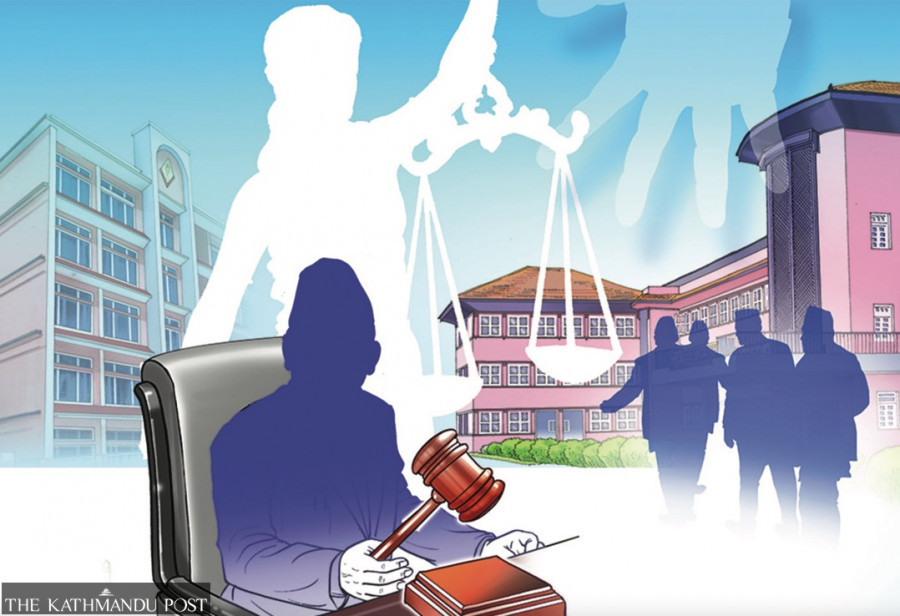National
Political indecision results in severe shortage of judges
Supreme Court set to be without nearly a third of justices. Fifty judges’ positions are vacant in seven high courts.
Binod Ghimire
The Supreme Court is short of six justices with the retirement of Justice Tanka Bahadur Moktan last week. It will also be headless next week as Chief Justice Hari Krishna Karki retires on August 5, taking the number of total vacant positions in the country’s highest court to seven. It has a total posting of 21 justices.
Yet neither a meeting of the Judicial Council, responsible for appointing justices and judges, nor that of the Constitutional Council for the recommendation of the chief justice, has yet been scheduled despite the constitutional and legal obligations to do so.
The Constitution of Nepal requires the Constitutional Council to nominate a chief justice candidate a month before the position becomes vacant. Had the Prime Minister Pushpa Kamal Dahal-led mechanism abided by Article 284 of the constitution, it would have recommended Karki’s successor by July 5.
Talking to the media upon his return from Cambodia on Monday evening, CPN-UML chair KP Sharma Oli accused the prime minister of breaching the constitutional provision. “He [Dahal] is not interested in summoning a Constitutional Council meeting,” Oli said. The leader of the opposition is an ex-officio member of the prime minister-led council. With Dahal too on a foreign trip, the date of the meeting is still uncertain. The members of the council must be informed 48 hours in advance about the meeting.
If the council doesn’t breach seniority, Bishowambhar Prasad Shrestha will succeed Karki as the chief justice. His nomination needs to be approved by the Parliamentary Hearing Committee before he is appointed by the President. The entire process might take around a month.
Shrestha will lead the judiciary as an acting chief justice from August 6 after Karki reaches the mandatory retirement age of 65 a day before.
Like the Constitutional Council, the date for the meeting of the chief justice-led Judicial Council is also uncertain. Differences between the chief justice and the Minister for Law and Justice Dhanraj Gurung are said to be a primary reason why the meeting hasn't been held. Gurung, a member of the council, wants Karki to retire before he can be involved in decisions to fill vacancies in all three tiers of court, a senior high court judge said.
“Gurung, with Shrestha’s support, wants to induct most of the new Supreme Court justices from Nepal Bar Association. Don't be surprised if five among the seven justice appointments are shared among the top parties,” said the judge. “As Shrestha needs the hearing committee's clearance, he wouldn't object to the minister.”
In the absence of a third of its justices, the Supreme Court is constituting six benches a day while there used be 10 on average when the court had a full set of justices. In an interaction with the journalists on July 31, Karki had said there was pressure on the judiciary to clear the cases in absence of necessary human strength.
As per the annual report of the judiciary submitted to the President last week, the top court could clear only 20.90 percent of cases in the fiscal year 2021-22. Of the 38,730 cases in the court’s docket during the fiscal year including 10,953 newly registered, it could clear only 8,096. It left 30,634 for another financial year. A total of 4,858 cases are older than five years.
The situation was similar in the fiscal year 2020-21. Of the total 33,466 cases including the backlog from previous years, the court could clear just 5,689 cases a year.
Failure of the Judicial Council to appoint judges in high courts has also affected the courts’ performance. High courts could clear 60.56 percent of cases in the fiscal year 2021-22, leaving 26,998 cases pending. The country’s seven high courts have 50 judge positions vacant and only one of them has the chief judge. There have been no appointments in the high courts for around two years now.
As per the annual report, the district courts have 107,130 pending cases, even though they had a 63.45 percent clearance rate. As many as 38 positions of district court judges remain vacant.
“Poor performance of the courts means people have been deprived of timely justice. The delay in appointing the chief justice and district judges weakens the judiciary,” Dinesh Tripathi, chairperson of the Constitutional Lawyers’ Forum, told the Post.




 18.12°C Kathmandu
18.12°C Kathmandu














